Printable Version of Topic
Click here to view this topic in its original format
914World.com _ 914World Garage _ Cylinder Head Temperature Sensor
Posted by: dlee6204 Jan 16 2021, 12:07 PM
I recently acquired a NOS temperature sensor for the one year only '73 Djet system 0 280 130 017. This sensor has been NLA for a very long time and finding a used one is very difficult. Given the rarity there isn't a lot of information on the proper resistance values of this sensor. Pbanders (https://members.rennlist.com/pbanders/DJetParts.htm) lists three data points for the resistance of this sensor but I thought I would post my findings. I also listed the values of the aftermarket sensor 0 280 130 012 available from 914Rubber.
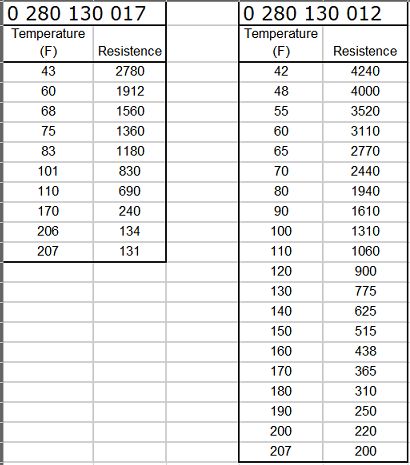
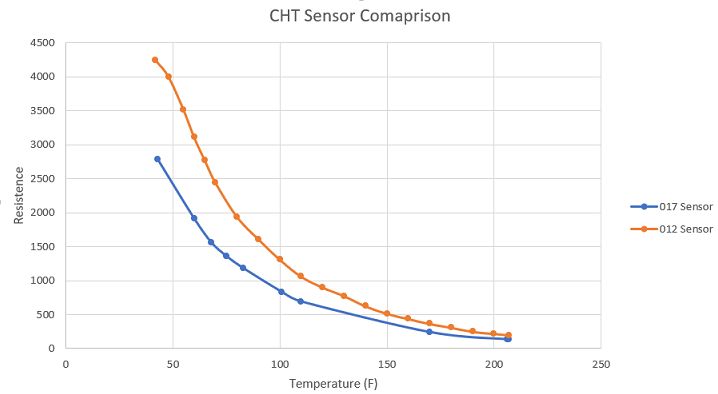
@http://www.914world.com/bbs2/index.php?showuser=22428 This answers some of your concerns.
Posted by: 914Sixer Jan 16 2021, 12:27 PM
Maybe this should go to classics so information is readily available.
Posted by: Superhawk996 Jan 16 2021, 12:30 PM
![]() @http://www.914world.com/bbs2/index.php?showuser=5956
@http://www.914world.com/bbs2/index.php?showuser=5956
This is awesome work. You're going to force my hand and get me motivated to measure and plot my used Bosch 0280130017 vs. a Bosch NOS 012 sensor sooner rather than later.
Great work. I'll try to carve off some time this weekend to see if I can add a 2nd data point to this fine work.
Posted by: Richard McLeod Jan 16 2021, 12:30 PM
I recently acquired a NOS temperature sensor for the one year only '73 Djet system 0 280 130 017. This sensor has been NLA for a very long time and finding a used one is very difficult. Given the rarity there isn't a lot of information on the proper resistance values of this sensor. Pbanders (https://members.rennlist.com/pbanders/DJetParts.htm) lists three data points for the resistance of this sensor but I thought I would post my findings. I also listed the values of the aftermarket sensor 0 280 130 012 available from 914Rubber.


@http://www.914world.com/bbs2/index.php?showuser=22428 This answers some of your concerns.
Do you use the 270 ohm resistor in series with CHT sensor?
Posted by: dlee6204 Jan 16 2021, 12:34 PM
I recently acquired a NOS temperature sensor for the one year only '73 Djet system 0 280 130 017. This sensor has been NLA for a very long time and finding a used one is very difficult. Given the rarity there isn't a lot of information on the proper resistance values of this sensor. Pbanders (https://members.rennlist.com/pbanders/DJetParts.htm) lists three data points for the resistance of this sensor but I thought I would post my findings. I also listed the values of the aftermarket sensor 0 280 130 012 available from 914Rubber.
@http://www.914world.com/bbs2/index.php?showuser=22428 This answers some of your concerns.
Do you use the 270 ohm resistor in series with CHT sensor?
This test is for the sensor only. I would add the inline resistor to any ‘73 2.0L system regardless of which sensor you are running.
Posted by: Superhawk996 Jan 16 2021, 12:37 PM
Maybe this should go to classics so information is readily available.
Posted by: nordfisch Jan 22 2021, 02:54 AM
Hi,
I really appreciate your work and started to transfer the 'Fahrenheit' into 'Celsius'-readings for a documentation.
I realized these readings do end below the temperature of boiling water - this isn't realistic for the operating temperature of an aircooled engine that should be at about 120°C - 250°F.
Following a German aircooled-forum, the critical temperature at the cylinder head is much higher - about 250°C - 480°F.
Could you please add some readings at higher temperature? You could use engine oil - I used vegetable oil for testings before but I don't own the 914-sensors.
------------------------------------------------------------------
Yes, the values of the sensors differ - but like superhawk996 wrote before, this will mostly affect the warming-up sequence. It would be interesting to know the values at a fully-warmed-up engine. Maybe there isn't any difference - and this is the point that matters.
D-Jet cars run quite rich in warming up, therefore the replacement-sensor could even be the better choice.
Best Regards
Norbert
Posted by: Superhawk996 Jan 22 2021, 06:39 AM
When I do my set up I'll extend past 212F but won't go to 480F. Would be at risk of dropping valve seats up at those temps. Propose stopping at 300 - 350F.
Posted by: BillJ Jan 22 2021, 08:47 AM
Come on Hawk! Grenade your heads for us in the name of SCIENCE. LOL
Posted by: Superhawk996 Jan 22 2021, 08:49 AM
Come on Hawk! Grenade your heads for us in the name of SCIENCE. LOL
Yeah, I think I'll go the oil route as Norbert suggested.
Posted by: MM1 Jan 22 2021, 11:08 AM
Thank you for posting this-think I asked this question here months ago but heard only crickets - so I truly appreciate your efforts! ![]()
A friend gave me on old CHTS so I thought I should check them both while the motor is out - are the values different for other D-jet years?
Posted by: adolimpio Jan 23 2021, 10:37 PM
There was a suggestion to add a 2400 ohm resister in parallel to the 012 to make it equivalent to the 017 at 70 degrees. I added a third line to the chart to show what that would look like. Doesn't look like a good idea - running pretty lean a low temps!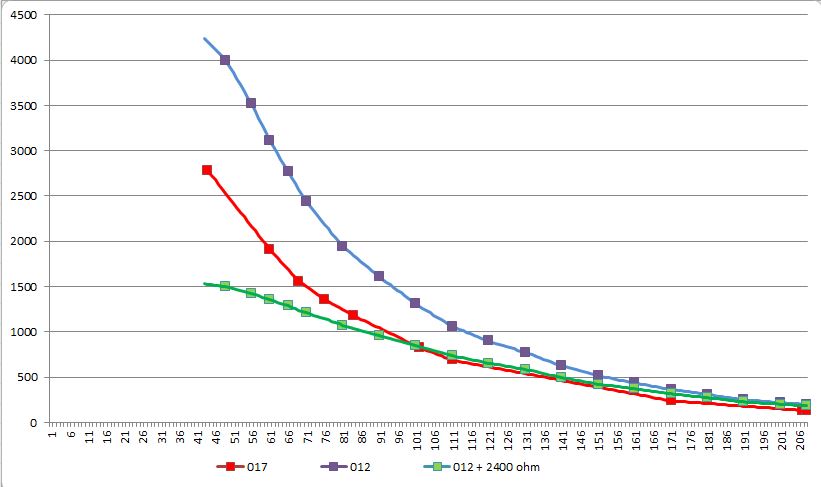
Posted by: 914Sixer Jan 24 2021, 07:52 AM
I have a couple 003 that were superceded by the 012. They are also used to enrich fuel on cold mornings according to Anders.
Posted by: nordfisch Jan 24 2021, 10:20 AM
Come on Hawk! Grenade your heads for us in the name of SCIENCE. LOL
I think you didn't realize in full what I wrote before - maybe because I'm not a native speaker, maybe because you don't realize the problem because you are just looking after some 'LOL' effects.
I just asked for some readings made at a realistic operating temperature.
This temperature is above the readings that have been posted.
Heating up the sensor in water doesn't reach the real engine head temperatures because the water boils... using oil instead is the way to measure at higher temperatures.
Best Regards
Norbert
Posted by: Superhawk996 Jan 24 2021, 10:22 AM
Will try to do this later today once I get tired of welding. I totally understood your proposal to use oil. I think the others were just having some fun.
Posted by: Olympic 914 Jan 24 2021, 10:37 AM
There was a suggestion to add a 2400 ohm resister in parallel to the 012 to make it equivalent to the 017 at 70 degrees. I added a third line to the chart to show what that would look like. Doesn't look like a good idea - running pretty lean a low temps!

The Cylinder Head Temps rise pretty quickly from those low temps. And from 80deg on they are pretty close. with the parallel resistor
I consider it a non-issue (JMHO)
It really depends on your engine.
I run a 1K resistor in parallel which theoretically should make my engine too lean at cold temps. But my wideband AFR tells a different story.
My engine will not idle nicely immediately upon startup. but once I drive 1 mile it is warm enough to idle (In my case, by the second Stop sign.)
One positive thing about the parallel resistor is if your CHT has a bad connection / failure, You engine will die on the spot. with the parallel resistor it will just go into a rich condition. You will still be able to drive on. I had this happen on the way home from Tennerpaluza. A little fiddling with the connection in the safety of a parking lot, instead of on the side of the road enabled me to remedy the problem and continue on.
Posted by: nordfisch Jan 24 2021, 11:58 AM
Hi,
my <water-cooled> engine died after 2 mls. The connector was broken.
Since then I have a simple 180-Ohm-resistor, 1/4 Watt in the car I could easily install.
@http://www.914world.com/bbs2/index.php?showuser=22428 : Thank you for doing the job...
Regards
Norbert
Posted by: Superhawk996 Jan 26 2021, 07:27 AM
Measured my used 017 sensor vs. New In Bag 012 Bosch sensor up to higher operating temperatures. As expected, both 017 and 012 converge to within about 10 ohms of each other at operating temperature. Remember that the 1973 only ECU setup is expecting a 270 ohm in-series resistor that would be expected in ADDITION to the 017 sensor. These measurements are of the sensor only.
Since I measured using oil up to higher temps my data set is light on temperatures below 44 degrees F. Since it's winter here in Michigan I may be able to use the weather to my advantage in the coming weeks to get some good data well below 32 F. ![]()
I measured in oil by heating on the way up and then allowing ambient cooling on the way down to get the hysteresis.
Here's my data alone 017 vs. 012 inclusive of hysteresis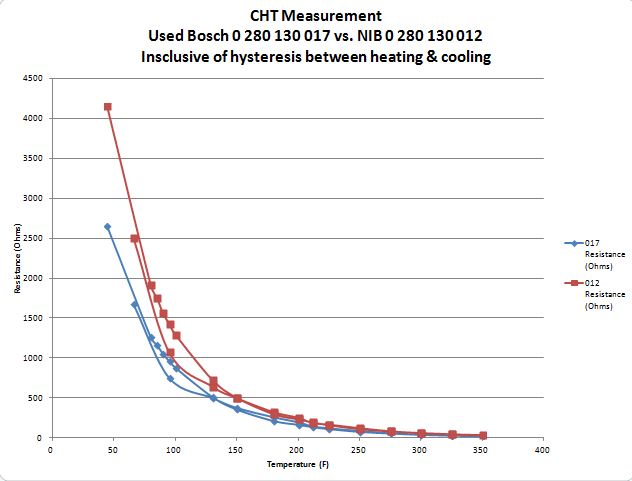
And my data combined with the intial data sets from @http://www.914world.com/bbs2/index.php?showuser=5956 to provide a second sample for a used 017 sensor and a NOS/NIB 012 Bosch sensor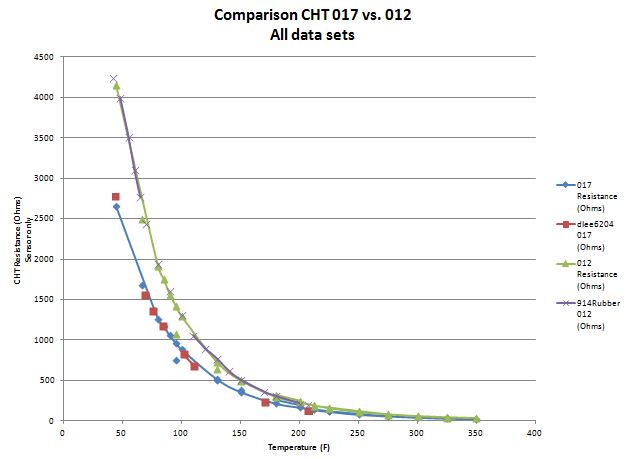
Data set: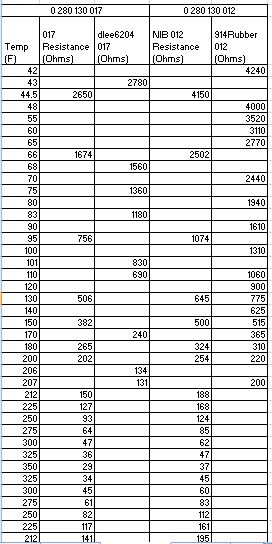
@http://www.914world.com/bbs2/index.php?showuser=19451
Posted by: nordfisch Jan 26 2021, 02:26 PM
Here's my data alone 017 vs. 012 inclusive of hysteresis
@http://www.914world.com/bbs2/index.php?showuser=22428
Thank you so much for your work!
I'll have the time to build a chart with the 'Celsius' values tomorrow.
......................................
I think the engine warms up so fast that the difference in the sensors doesn't matter much.
Yes, an engine will run up to four times richer at temperatures way below zero (Celsius) <the same as if the sensor cable is broken>, but the sensor will warm up in much less than one minute and the mixture will be in the normal range soon.
Best regards
Norbert
Posted by: nordfisch Jan 29 2021, 11:52 AM
Hi,
sorry for replying later than supposed...
In the meantime I contacted Volker Huck from jetronic.org and asked him for values of the influence of the CHT resistance to the injection time.
He didn't measure it up to this time. Said he had to do it using the specific ECU-type because they all react different.
But he has the same opinion as we have - the difference between the sensors doesn't matter much because the engine head warms up rapidly in after a short time the sensors show almost the same values then.
He reminded me there are values for the ...017-sensor in the German workshop- manual published by Bosch...
I have to say the values from Bosch are meant without resistor and I tried to read out the values in my chart below from @http://www.914world.com/bbs2/index.php?showuser=22428 's graphic and from his chart.
Please notice the sensor data published by Bosch is at different temperatures for the different sensors.
I think, there is an error in the readings of the first 017 sensor <blue>.
Magnifying the graph, I can see a double line, too... think I corrected the error in my chart.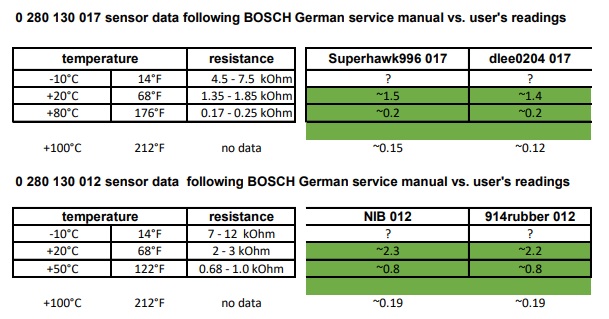
Regards
Norbert
Posted by: Superhawk996 Jan 29 2021, 05:52 PM
In the meantime I contacted Volker Huck from jetronic.org and asked him for values of the influence of the CHT resistance to the injection time.
He didn't measure it up to this time. Said he had to do it using the specific ECU-type because they all react different.
@http://www.914world.com/bbs2/index.php?showuser=19451
WOW that would be super interesting. Being able to correlate injector pulse time to the CHT with the specific ECU.
It has been documented on the B. Anders site that the 73' ECU is a unique animal so I agree that it would need to be done with the MY73 ECU to get the right result.
What is really interesting to think about is how a 70's vintage ECU gets "calibrated" in an era where that calibration was done by changing the physical analog circuits rather than putting 1's & 0's in memory!
Although I do agree there is no practical difference in the sensors once at operating temperature I do have concerns and believe that there is such a significant difference in between 017 sensors and 012 sensors, that the starting, idle and warm-up could be pretty compromised with an 012 sensor in a 73' 2.0L ECU setup. I can't say this for sure as I have yet to assemble my 2.0L engine and to convert it to FI from carbs as I received it. I'm looking forward to trying both sensors though to help solve the riddle.
Next up. I think i have 022 906 041A sensor that is also stamped 0 280 130 017 and yet I believe it reads more like a 012 sensor at ambient temp and cold temps. I need to dig it out and measure it and compare the the 012 curves that have just been documented. I belive there was a period of time where Bosch was transitioning the 1973 017 sensors and mistamped some 012's as 017's.
Posted by: Superhawk996 Jan 30 2021, 10:08 AM
I missed out on 8 degree F temp this morning. By the time I got my act in gear it was 22F.
I'll keep updating this post as I am able to add lower and lower temperatures as the weather permits. 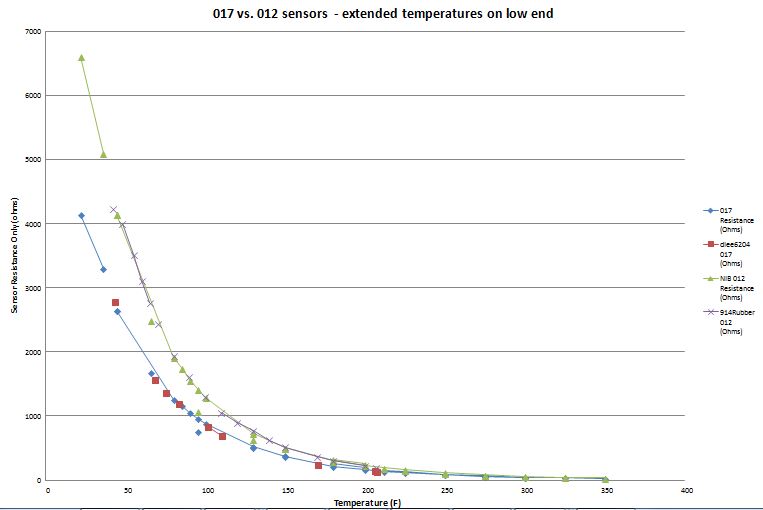
Posted by: Superhawk996 Jan 30 2021, 10:40 AM
Just added to other thread[attachmentid=778724] on what the CHT resistor looks like so I'll repost here too.
Spec is 270 Ohms and is probably typical +/- 10% to 20% tolerance for non-precision resistors.
Per Brad Anders site he lists them as 1/4 - 1/2 watt whichs seems very plausible given no significant current flows through the CHT sensor itself. 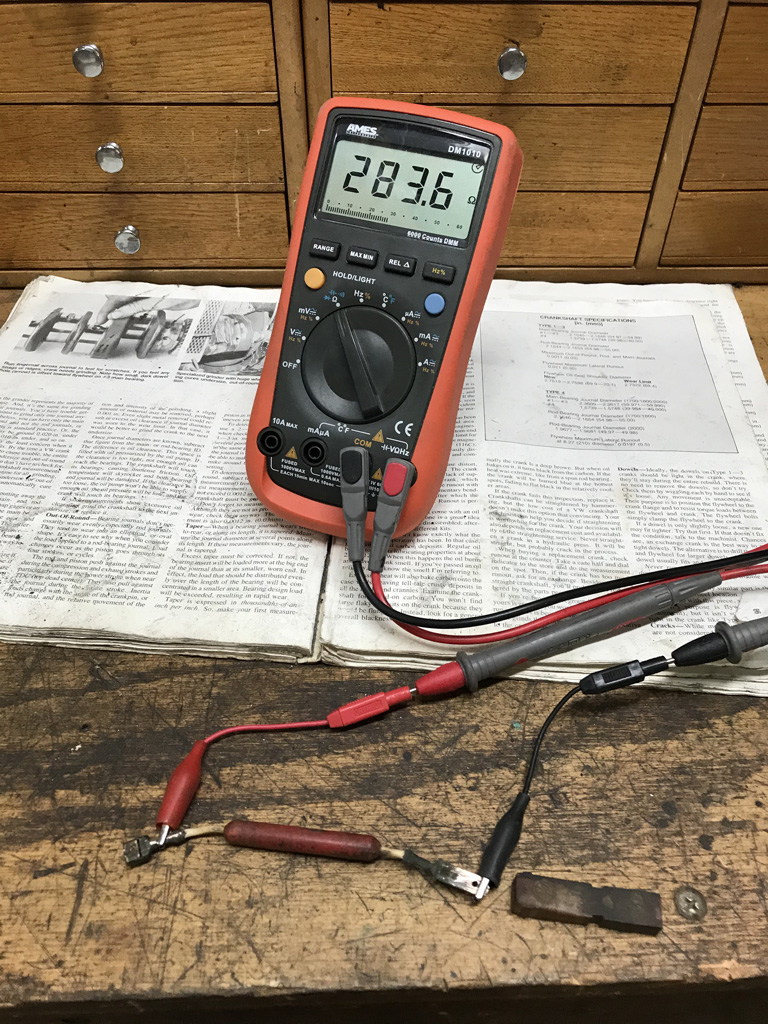
Posted by: Olympic 914 Jan 30 2021, 11:13 AM
correct me if I am wrong but
I see no reason, other than concours correctness, to use the original resistor instead of any 1/2 - 1 watt resistor of the same size
Presently i do not have the 270 ohm resistor installed on my 2.0 FI with 037 ECU but it would be easy enough to plug one in and see what it does.
Right now my MPS is tuned without the resistor.
Posted by: Superhawk996 Jan 30 2021, 11:24 AM
correct me if I am wrong but
I see no reason, other than concours correctness, to use the original resistor instead of any 1/2 - 1 watt resistor of the same size
Presently i do not have the 270 ohm resistor installed on my 2.0 FI with 037 ECU but it would be easy enough to plug one in and see what it does.
Right now my MPS is tuned without the resistor.
You are correct, a resistor is a resistor, is a resitor for a given resistance value. The only thing that really would matter is the power rating.
If you've already tuned your MPS without the resistor and are happy, I wouldn't mess with it.
I'm no D-jet expert but all the research I've done (Anders + other Djet sites) indicates that the analog ECU expects the resitance of the CHT + a 270 ohm offset for these 1973 ECU's.
Overall the end effect of the added 270 ohms on any other ECU (at operating temperature 200F +) would be to make the ECU think its running a bit colder and threfore a bit richer.
Powered by Invision Power Board (http://www.invisionboard.com)
© Invision Power Services (http://www.invisionpower.com)
